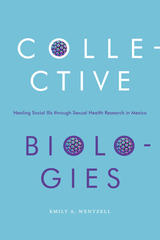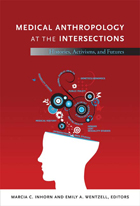3 books about Wentzell, Emily A.

Collective Biologies
Healing Social Ills through Sexual Health Research in Mexico
Emily A. Wentzell
Duke University Press, 2021
In Collective Biologies, Emily A. Wentzell uses sexual health research participation as a case study for investigating the use of individual health behaviors to aid groups facing crisis and change. Wentzell analyzes couples' experiences of a longitudinal study of HPV occurrence in men in Cuernavaca, Mexico. She observes how their experiences reflected Mexican cultural understandings of group belonging through categories like family and race. For instance, partners drew on collective rather than individualistic understandings of biology to hope that men's performance of “modern” masculinities, marriage, and healthcare via HPV research would aid groups ranging from church congregations to the Mexican populace. Thus, Wentzell challenges the common regulatory view of medical research participation as an individual pursuit. Instead, she demonstrates that medical research is a daily life arena that people might use for fixing embodied societal problems. By identifying forms of group interconnectedness as “collective biologies,” Wentzell investigates how people can use their own actions to enhance collective health and well-being in ways that neoliberal emphasis on individuality obscures.
[more]

Maturing Masculinities
Aging, Chronic Illness, and Viagra in Mexico
Emily A. Wentzell
Duke University Press, 2013
Maturing Masculinities is a nuanced exploration of how older men in urban Mexico incorporate aging, chronic illness, changing social relationships, and decreasing erectile function into their conceptions of themselves as men. It is based on interviews that Emily A. Wentzell conducted with more than 250 male patients in the urology clinic of a government-run hospital in Cuernavaca. Drawing on science studies, medical anthropology, and gender theory, Wentzell suggests the idea of "composite masculinities" as a paradigm for understanding how men incorporate physical and social change into gendered selfhoods.
Erectile dysfunction treatments like Viagra are popular in Mexico, where stereotypes of men as sex-obsessed "machos" persist. However, most of the men Wentzell interviewed saw erectile difficulty as a chance to demonstrate difference from this stereotype. Rather than using drugs to continue youthful sex lives, many collaborated with wives and physicians to frame erectile difficulty as a prompt to embody age-appropriate, mature masculinities.
[more]

Medical Anthropology at the Intersections
Histories, Activisms, and Futures
Marcia C. Inhorn and Emily A. Wentzell, eds.
Duke University Press, 2012
In this important collection, prominent scholars who helped to establish medical anthropology as an area of study reflect on the field's past, present, and future. In doing so, they demonstrate that medical anthropology has developed dynamically, through its intersections with activism, with other subfields in anthropology, and with disciplines as varied as public health, the biosciences, and studies of race and ethnicity. Each of the contributors addresses one or more of these intersections. Some trace the evolution of medical anthropology in relation to fields including feminist technoscience, medical history, and international and area studies. Other contributors question the assumptions underlying mental health, global public health, and genetics and genomics, areas of inquiry now central to contemporary medical anthropology. Essays on the field's engagements with disability studies, public policy, and gender and sexuality studies illuminate the commitments of many medical anthropologists to public-health and human-rights activism. Essential reading for all those interested in medical anthropology, this collection offers productive insight into the field and its future, as viewed by some of the world's leading medical anthropologists.
Contributors. Lawrence Cohen, Didier Fassin, Faye Ginsburg, Marcia C. Inhorn, Arthur Kleinman, Margaret Lock, Emily Martin, Lynn M. Morgan, Richard Parker, Rayna Rapp, Merrill Singer, Emily A. Wentzell
Contributors. Lawrence Cohen, Didier Fassin, Faye Ginsburg, Marcia C. Inhorn, Arthur Kleinman, Margaret Lock, Emily Martin, Lynn M. Morgan, Richard Parker, Rayna Rapp, Merrill Singer, Emily A. Wentzell
[more]
READERS
Browse our collection.
PUBLISHERS
See BiblioVault's publisher services.
STUDENT SERVICES
Files for college accessibility offices.
UChicago Accessibility Resources
home | accessibility | search | about | contact us
BiblioVault ® 2001 - 2024
The University of Chicago Press









